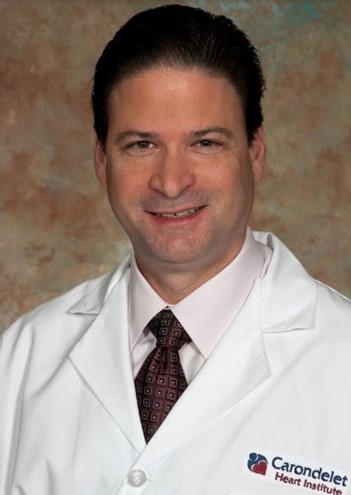Don't Let The Holidays Hurt Your Heart
The holidays are to supposed to make your heart "skip a beat," but if your heart actually does beat irregularly, you may want to pay special attention. The incidents of cardiac issues including heart attacks and cardiac arrhythmias and others tend to rise during the holidays, and are often thought to be mere mild cases of overindulgence.

Dr. Michael Liston is with Kansas City Cardiology on the St. Mary's campus.
While overindulgence may likely be involved, it may also be a serious health issue such as Holiday Heart Syndrome or a more serious cardiac illness. These cardiac conditions can affect just about anyone.
First described back in 1978, by the late cardiologist, Philip Ettinger, MD, holiday heart syndrome is an irregular heartbeat (arrhythmia) that can crop up in individuals who are otherwise healthy. Although it is often associated with binge drinking, Ettinger's study also showed the condition occurs in individuals who consume only moderate amounts of alcohol.
Excessive alcohol intake in women is defined by the U.S. Department of health and Human Service (HHS) as consuming seven or more drinks per week or more than three doses at one time. For men, heavy consumption is defined as more than 14 drinks per week or more than four drinks at one sitting.
And although it's mainly attributed to alcohol and excessive amounts of food, caffeine and lack of sleep can also figure into the problem. Risk factors include:
- Overeating
- Stress
- High levels of sodium consumption
- Dehydration
A common symptom is a sensation that the heart is pounding or racing. These are called palpitations and can be felt in your chest, throat, or neck. It may start with an unpleasant awareness of your own heartbeat and perhaps feel like your heart has skipped or stopped beats.
These type of arrhythmias can be very serious. Palpitations lasting for more than a few hours should receive medical attention. Atrial fibrillation (AFib) is the most common arrhythmia in holiday heart syndrome and while the fibrillation is usually fleeting, it can lead to stroke and more rarely heart attack.
Alcohol alone doesn't fully explain the problem, but it has a tendency to heighten stress hormones which control your heart rate and blood vessels. Alcohol also impacts electrolytes (particularly sodium), which play a key role in your heart rhythm. Heavy alcohol use dehydrates you, depleting electrolytes like potassium and magnesium, which affect the way the heart responds to adrenaline in your body.
Afib can take a normal heart rate between 70 to 100 beats per minute to as high as 150-200 beats per minute.
The problem with holidays is that we tend to take a holiday from our normal lifestyles and often indulge in behaviors that affect our health. It makes sense, at least to be aware of those behaviors. Remember:
- The holidays can still be special with fewer drinks and a little less food. Portion control should still apply, no matter how many stops at multiple gatherings you face.
- Heavy meals can trigger heart problems. Salty gravies and stuffing can raise your blood pressure and force your heart to work overtime.
- Stagger your drinks throughout the night alternate water between adult beverages.
- Keep your stress in check. Make sure that long to-do list includes pacing yourself during the holidays in whatever you may be doing in relation to travel, shopping, eating, drinking and decorating.
- Make time for exercise. Shorter and much colder days tend to keep us indoors. Make an effort to get to a gym or local mall and at least walk.
- Get enough sleep! Your health suffers without it.
If you experience a heartbeat that seems fast or different after a holiday meal, don't take it for granted. Stop eating and drinking and sit or lie down. If the sensation continues for more than five minutes, it's time to call 911. Continued arrhythmias can require medications to help regulate heart function - and future problems.
Dr. Michael Liston is with Kansas City Cardiology on the St. Mary's campus. He can be reached at 816-220-1117.
Afib can take a normal heart rate between 70 to 100 beats per minute to as high as 150-200 beats per minute.
Original Story courtesy of Waynesville Daily Guide
http://www.waynesvilledailyguide.com/news/20161206/dont-let-holidays-hurt-your-heart


